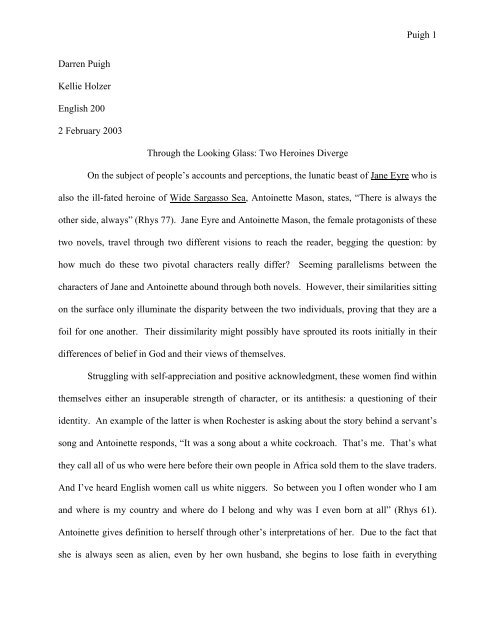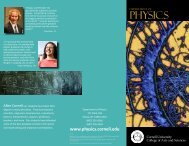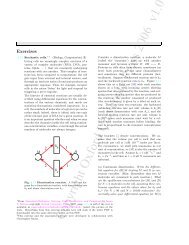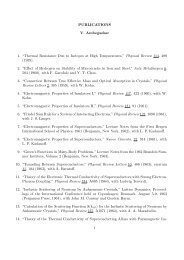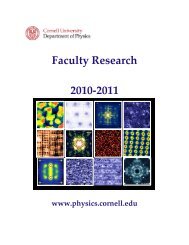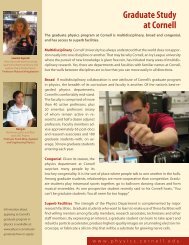Jane Eyre and Wide Sargasso Sea - Physics
Jane Eyre and Wide Sargasso Sea - Physics
Jane Eyre and Wide Sargasso Sea - Physics
You also want an ePaper? Increase the reach of your titles
YUMPU automatically turns print PDFs into web optimized ePapers that Google loves.
Puigh 1<br />
Darren Puigh<br />
Kellie Holzer<br />
English 200<br />
2 February 2003<br />
Through the Looking Glass: Two Heroines Diverge<br />
On the subject of people’s accounts <strong>and</strong> perceptions, the lunatic beast of <strong>Jane</strong> <strong>Eyre</strong> who is<br />
also the ill-fated heroine of <strong>Wide</strong> <strong>Sargasso</strong> <strong>Sea</strong>, Antoinette Mason, states, “There is always the<br />
other side, always” (Rhys 77). <strong>Jane</strong> <strong>Eyre</strong> <strong>and</strong> Antoinette Mason, the female protagonists of these<br />
two novels, travel through two different visions to reach the reader, begging the question: by<br />
how much do these two pivotal characters really differ Seeming parallelisms between the<br />
characters of <strong>Jane</strong> <strong>and</strong> Antoinette abound through both novels. However, their similarities sitting<br />
on the surface only illuminate the disparity between the two individuals, proving that they are a<br />
foil for one another. Their dissimilarity might possibly have sprouted its roots initially in their<br />
differences of belief in God <strong>and</strong> their views of themselves.<br />
Struggling with self-appreciation <strong>and</strong> positive acknowledgment, these women find within<br />
themselves either an insuperable strength of character, or its antithesis: a questioning of their<br />
identity. An example of the latter is when Rochester is asking about the story behind a servant’s<br />
song <strong>and</strong> Antoinette responds, “It was a song about a white cockroach. That’s me. That’s what<br />
they call all of us who were here before their own people in Africa sold them to the slave traders.<br />
And I’ve heard English women call us white niggers. So between you I often wonder who I am<br />
<strong>and</strong> where is my country <strong>and</strong> where do I belong <strong>and</strong> why was I even born at all” (Rhys 61).<br />
Antoinette gives definition to herself through other’s interpretations of her. Due to the fact that<br />
she is always seen as alien, even by her own husb<strong>and</strong>, she begins to lose faith in everything
Puigh 2<br />
around her, including herself <strong>and</strong> her beliefs. This can be seen later in life when she responds to<br />
whether she believes in God or not by saying, “It doesn’t matter what I believe or you believe,<br />
because we can do nothing about it, we are like these [dead moths killed by flying into the c<strong>and</strong>le<br />
flame]” (Rhys 77). Antoinette gives no credence to her life or her accomplishments. However,<br />
<strong>Jane</strong> does not follow this path. Ms. <strong>Eyre</strong> maintains a resilience in her beliefs of self <strong>and</strong> God, no<br />
matter the adversity, internal or external. The reader can see this in the text through the insight<br />
of <strong>Jane</strong>’s thoughts in response to Rochester’s plea. He wishes her to run away with him, since no<br />
one in the world would care or be injured by her transgression. <strong>Jane</strong> reflects, “I care for myself.<br />
The more solitary, the more friendless, the more unsustained I am, the more I will respect<br />
myself. I will keep the law given by God; sanctioned by man” (Brontë 270). It matters not how<br />
others conceive her, but rather how she views herself. Essentially, she is making a vow to be<br />
true to herself <strong>and</strong> to be true to the laws that she is governed by. This is coupled with her<br />
absolute trust in her God. It is clear to see this unalterable faith when explaining to Rochester<br />
how power can be abused by humans when <strong>Jane</strong> says, “The human <strong>and</strong> fallible should not<br />
arrogate a power with which the divine <strong>and</strong> perfect alone can be safely entrusted” (Brontë 118).<br />
<strong>Jane</strong> finds a love for herself <strong>and</strong> God that is encompassing, forgiving, <strong>and</strong> ever-growing.<br />
While there lies a freedom in the expression of love for <strong>Jane</strong> after fighting her own<br />
demons of self-doubt, those demons remain for Antoinette who ensconces her love away. When<br />
talking about her honeymoon home with Rochester on the isl<strong>and</strong> of Dominica, Antoinette<br />
exclaims, “I love it more than anywhere in the world. As if it were a person. More than a<br />
person” (Rhys 53). Later on in the book, she goes on to describe her love for her home by<br />
saying, “I loved it because I had nothing else to love, but it is as indifferent as this God you call<br />
on so often” (Rhys 78). Possibly due to Antoinette’s past relationships, she perhaps feels more
Puigh 3<br />
secure in entrusting her full love to a place instead of a person, especially since she feels she had<br />
nothing else to love. An unchanging l<strong>and</strong> that delivers warmth <strong>and</strong> protection, it gives her what<br />
no man could <strong>and</strong> what she truly desires: peace. In contrast, Mr. Rochester asks <strong>Jane</strong> if she will<br />
be sorry to leave Thornfield, <strong>and</strong> she answers, “I love Thornfield – I love it, because I have lived<br />
in it a full <strong>and</strong> delightful life, - momentarily at least. I have not been trampled on. I have not<br />
been petrified” (Brontë 215). It is clear to see that her love of a place is the result of the social<br />
interactions that she had while in residence of that environment. Nature, while important, is the<br />
backdrop of a play consisting of actors such as herself <strong>and</strong> those she cares for. It’s in the way<br />
that these two express their love that their incongruity becomes most apparent.<br />
Despite the dissonance between their views of themselves <strong>and</strong> their situations when they<br />
are older, one can’t help but draw analogous elements from these two lives. Both of them grew<br />
without the loving support of their parents. Both have a companion of sorts during their<br />
childhood in the capacity of a nanny; <strong>Jane</strong> has Bessie <strong>and</strong> Antoinette has Christophine. Both go<br />
off to school when they are young (either to a convent or an institution) where they are, in effect,<br />
ab<strong>and</strong>oned. What makes these two characters a foil of one another is that they grow into such<br />
separate <strong>and</strong> distinct adults, in spite of the fact that they come from such comparable<br />
upbringings. So, although their environment sought to shape their temperament, the uniqueness<br />
of each individual remains apparent. It was best said by the national spokesman for Literacy<br />
Volunteers of America, Wally Amos (1936 - ), who believed that “life is just a mirror, <strong>and</strong> what<br />
you see out there, you must first see inside of you.”
Puigh 4<br />
Works Cited<br />
Brontë, Charlotte. <strong>Jane</strong> <strong>Eyre</strong>. New York: W. W. Norton & Company, 2001.<br />
Rhys, Jean. <strong>Wide</strong> <strong>Sargasso</strong> <strong>Sea</strong>. New York: W. W. Norton & Company, 1999.
Puigh 5<br />
Life is just a mirror, <strong>and</strong> what you see out there, you must first see inside of you.<br />
Wally 'Famous' Amos (1936 - )<br />
diverge<br />
Given similar opportunities, different baggage, different adults.<br />
Way they react to Rochester. JE – turn to religion to escape (t.253), WSS – turn to obeah to go<br />
back<br />
JE keeping it real, not an angel, keeping him one step back, not given in<br />
m.247, not treating jane like human being<br />
Rochester, name<br />
<strong>Jane</strong>t = Bertha t.83, b.106<br />
Betrayal<br />
Amelie = Bertha<br />
Red-room = looking glass<br />
Childhoods<br />
Courage through hate, b.29 for WSS, reacts to adultery with hate b. 88 WSS<br />
m.61, self-identity WSS<br />
Inmate<br />
JE: t.73, t.105, b.118, t.207, t.326<br />
Love<br />
<strong>Jane</strong>: b.63, m.71, b.136, t.149, b.209, b. 210 (called to presence), m.215, t.255 (unchanged<br />
love)<br />
WSS: b.67-t.68, t.53,<br />
JE, home in people, Bertha, home/love in a place<br />
Religion:<br />
WSS: b.76-77, m.78, b.25, b.34<br />
JE: t.107, m.118, m.274<br />
t.151<br />
m. 158, <strong>Jane</strong> genuine, Bertha not


